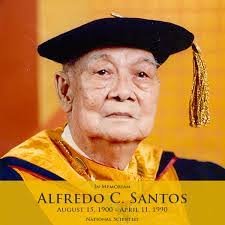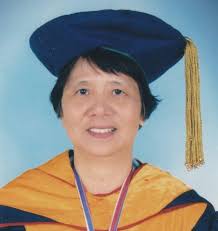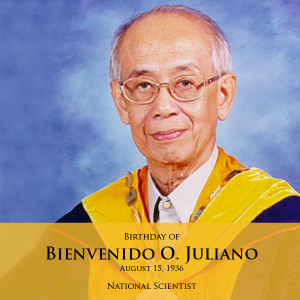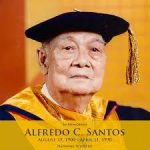Philipine has some influential like Julian Banzon, Fransisco Santos, Alfredo Santos, Lourdes Jansuy Cruz, Dr. Jose Juliano, Amando Kapauan, etc. In this article we would like to discuss some list of Filipino chemists and their contributions.
List of Filipino Chemists and Their Contributions
There are some influential chemists in Philiphine and their contribution, as follows :
- Dr. Alfredo Santos
 Dr. Alfredo Santos is known for his studies in the chemistry of natural harvest. He was born July 13, 1905 in Santa Cruz, Manila. He has some nicknames like Hammer, Hero of the pockets, First Four – star general. He has completed a lot of work in the segregation and elucidation of the phaeantharine and other alkaloids from Philippine medical plants. (Read Chemicals Derived from Plants)
Dr. Alfredo Santos is known for his studies in the chemistry of natural harvest. He was born July 13, 1905 in Santa Cruz, Manila. He has some nicknames like Hammer, Hero of the pockets, First Four – star general. He has completed a lot of work in the segregation and elucidation of the phaeantharine and other alkaloids from Philippine medical plants. (Read Chemicals Derived from Plants)
The ultimate goal of his research was to help lower the prices of pharmaceuticals by finding natural alternatives that could perform as substitutes to the sometimes overly pricy imported materials that were so popular at that time. He was elected as Academician in 1978 and conferred as National Scientist in 1978.
Many people in the countryside couldn’t afford those imported drugs, and so there was a high need for these lower-priced alternatives that he helped the champion.
He was elected as Academician in 1978 and conferred as National Scientist in 1978.
Dr. Santos served in different capacities at the University of the Philippines for 45 years until he stop working in 1965 as Dean of the College of Pharmacy. After his UP stint, Dr. Santos sustained to do study at the UST Research Center and the National Institute of Science and Technology (NAST).
In appreciation of his innovative experimental researches in various alkaloids isolated from Philippine medicinal plants, he acknowledged President Magsaysay’s Distinguished Service Star in 1954. In 1953, he is also a receiver of the Outstanding Pharmacist Researcher of the Philippine Pharmaceutical Association and Phil AAS Outstanding Scientist Award in 1973.
He died on February 7, 1990, in Manila, Philippine at the the age of 84.
- Evelyn Mae T. Mendoza
 The work of Evelyn T. Mendoza is well known and she was recognized for her research in the field of plant biochemistry particularly, one the biochemical basis of the makapuno phenotype of coconut; on the factors affecting the nutritional worth and suitability of cowpea, mungbean and numerous under utilized Philippine indigenous legumes, cassava and sweet potato; and on the biochemical source of resistance of preferred plants to pest or illness. (Read Application of Biochemistry in Daily Life)
The work of Evelyn T. Mendoza is well known and she was recognized for her research in the field of plant biochemistry particularly, one the biochemical basis of the makapuno phenotype of coconut; on the factors affecting the nutritional worth and suitability of cowpea, mungbean and numerous under utilized Philippine indigenous legumes, cassava and sweet potato; and on the biochemical source of resistance of preferred plants to pest or illness. (Read Application of Biochemistry in Daily Life)
Beside that, her research includes the chemicals and biology of the coconut plants, and various factors that affect mung bean.
Her work with mung bean was meant to help analyze nutritional factors and worth of the plant, for a higher level of nutrition for the public. This also helped with breeding, planting techniques, and a wide variety of other factors that affected the agricultural world, to help make plants grow better and improve their economical worth in the long run.
- Dr. Jose Juliano
 Dr. Jose Juliano was born on October 16, 1932. After obtaining his Ph.D with straight A’s at the age of 22, Dr. Juliano consistently demonstrated excellence in research.
Dr. Jose Juliano was born on October 16, 1932. After obtaining his Ph.D with straight A’s at the age of 22, Dr. Juliano consistently demonstrated excellence in research.
Dr.Juliano is known for his researches in nuclear chemistry and physics.
Noteworthy of his published research works with total 50 are rapid and non-destructivr analysis of sulfur and calcium by radio activation and photo neutron counting and disintegration of iron-52 and iron-53. (Read Uses of Sulfur and Its Compounds in Daily Life)
In 1959, Dr.Jose Julian was one of the receivers of the TONYM award for his involvement in Nuclear Science.
His contributions have helped manage better understanding of nuclear science. (Read Radioactive Chemical List)
- Francisco Santos
Francisco Santos is a Filipino agricultural chemist. Doctor Francisco Santos studied the nutritive values and chemical composition of local foods from the Philippines. His data was used to help detect and solve problems with Filipino diets.
Francisco Santos – Degrees:
- B., University of the Philippines, 1914
- S., University of the Philippines, 1919
- D. Agricultural Chemistry, Yale University, 1922
Doctor Francisco Santos was recipient of a number of awards including:
- Distinguished Service Medal for outstanding contribution in the field of nutrition among Filipinos in 1955
- Andres Soriano award in chemistry in 1956
- University of the Philippines Alumni award in 1979
- Julian Banzon
Julian Banzon researched methods of producing alternative fuels. Julian Banzon experimented with the production of ethyl esters fuels from sugarcane and coconut, and invented a means of extracting residual coconut oil by a chemical process rather than a physical process.
Julian Banzon – Degrees:
- BS in Chemistry from the University of the Philippines – 1930
- Ph.D. in Biophysical Chemistry from Iowa State University – 1940
Julian Banzon – Awards:
- 1980: Distinguished Service Award – Integrated Chemist of the Philippines, Inc.
- 1978: Chemist of the Year Award – Professional Regulation Commission
- 1976: Philsugin Award – Crop Society of the Philippines
Dr. Banzon has done a great deal of work on local materials especially coconut as the renewable source of chemicals and fuels. His work on the production of ethyl esters from sugarcane and coconut is the first study on fuels from these crops. He also devised some novel processes noteworthy among these is the extraction of residual coconut oil by chemical, rather than by physical processes.
For these and many more significant scientific works, Dr. Banzon has been accorded honors and citations notably: Distinguished Service Award, Integrated Chemist of the Philippines, Inc. (1980), Chemist of the Year Award, Professional Regulation Commission (1978) and the PHILSUGIN Award for research, Crop Society of the Philippines, 1976.
- Lourdes Jansuy Cruz, PhD
Lourdes Jansuy Cruz, PhD is a Filipina biochemist. She is best known for her research on the properties of toxins found in Conus snails. She was conferred the rank and title of National Scientist in 2008.
Dr. Lourdes Cruz graduated with a BS Chemistry degree from the University of the Philippines, Diliman in 1962. She then finished her MS and PhD in Biochemistry at the University of Iowa, United States, 1966 and 1968, respectively. Upon her return to the Philippines, she served as a research aide in 1962 at the International Rice Research Institute. She then began teaching as assistant professor at the UP Department of Biochemistry in 1970, and became a full professor in 1977.
Cruz then served as chair of the UP Department of Biochemistry and Molecular Biology from 1980 to 1986. In addition, she was also a research associate and professor in the University of Utah. Currently she is based at the UP Marine Science Institute.
Dr. Lourdes Cruz has published over 120 scientific papers, and has contributed greatly to the understanding of the biochemistry of toxic peptides gathered from the venom of fish-hunting Conus marine snails. Her studies contributed to the characterization of over 50 biologically active peptides, which were later used as biochemical probes for examining the activities of the human brain. (Read List of the Categories of Essential Biochemical Compound)
In 2001, she established the Rural Livelihood Incubator, a program which aimed to alleviate poverty and socio-political instability in the rural areas by giving job and livelihood opportunities to their people.
In 1981, Dr. Cruz received the Outstanding Young Scientist Award from the National Academy of Science and Technology (NAST), and was elected to the Academy in 1986. She also received the National Research Council of the Philippines (NRCP) Achievement Award in Chemistry in 1982, and the Outstanding Women in the Nation’s Service Award (Biochemistry) in 1986. (Read Sub Branches of Biochemistry)
Those are some influential list of Filipino chemists and their contributions. Hope this article is useful. Thanks.

